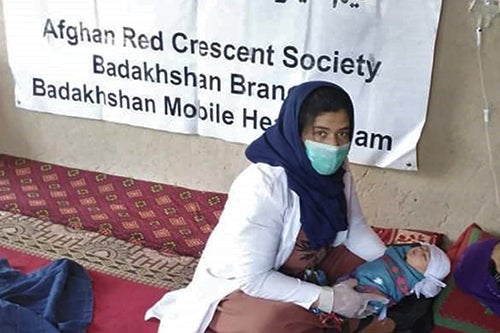News
Mobile health teams bring critical services to women in remote Afghanistan
- 03 September 2020
News
BADAKHSHAN, Afghanistan – It has been a harrowing year for women and girls in Afghanistan. In the first quarter of 2020, just as the COVID-19 pandemic was just reaching Afghanistan, flash floods were causing mass displacements around the country, and armed conflict and economic turmoil continued to leave much of the population in need of humanitarian assistance.
For many women and girls, access to vital health services was already precarious before COVID-related movement restrictions were put into place.
This was the case for Jan Bibi, 42, in Shaikhan Village, in the district of Shahri Buzurg.
Jan Bibi was the mother of eight children and pregnant with her ninth. She was unable to visit the district clinic for antenatal care because the cost of transport was too high – particularly after spring floods destroyed local infrastructure.
“Due to flash floods, the roads and bridges are destroyed. If I want to go to the district clinic, I have to pay 4,000 afghanis [about $50], which is impossible for my family,” she said.

To reach women like Jan Bibi, UNFPA is fully or partially funding the deployment of 14 mobile health teams in Afghanistan. These teams are groups of health professionals who travel to remote communities to provide essential health services, including antenatal care, post-natal care, family planning services and vaccinations.
In May, one such health team was visiting Shaikhan. The team – consisting of a medical doctor, midwife, nurse, pharmacist and a driver – is supported by the Afghan Red Cross Society with funds from UNFPA and the Government of Australia.
Friba Delaway, the midwife, remembers meeting Jan Bibi, who was in her thirty-first week of pregnancy. “I found that Bibi was suffering from chronic anaemia and she needed to be counselled for an immediate change in diet. I provided her with a number of ferrous folic acid tablets,” Ms. Delaway said. “I knew she was very vulnerable and needed my support, so I gave her my contact number and told her to contact me when needed.”
Jan Bibi began to contact Ms. Delaway regularly for advice and consultations. She was able to receive antenatal care and required medicines through the mobile team.
When she went into labour, she called Ms. Delaway.
“At the time, I was busy with serving other women, however, I knew I had to travel to Shaikhan Village,” the midwife recalled. “When I arrived at her village and examined Bibi, I found that she was suffering from anaemia, high blood pressure and fever.”
Hours passed, but Ms. Delaway stayed by Jan Bibi’s side. “Fortunately and finally, the baby boy was born safely,” Friba said.
Jan Bibi’s husband, Niamtullah, knows that this happy outcome was not guaranteed. Afghanistan has one of the highest maternal mortality rates in the world, with 638 deaths per 100,000 live births. “We really needed the support at such a critical time,” he said. “I was not able to take my wife to the district hospital, if [the mobile health team] had not been here… we don’t know what would have happened.”
In the first half of 2020, Ms. Delaway’s mobile health team provided services to 23 villages, reaching 1,840 families.
Their work – already treacherous due to difficult terrain and insecurity – has become even more dangerous under the pandemic.
There have been more than 38,000 confirmed cases of COVID-19 in Afghanistan, according to the World Health Organization. Nearly 10 per cent of confirmed cases have been among health-care staff.
UNFPA is providing protective equipment to the mobile health teams, and supporting protective supplies and measures in larger hospitals as well.
“Despite the security and access problems, I’m committed to my mission and continue to support these vulnerable women,” Ms. Delaway said. “COVID-19 is an additional life-threatening risk, but I follow the infection prevention measures and try my best to help the women who expect and need my support.”